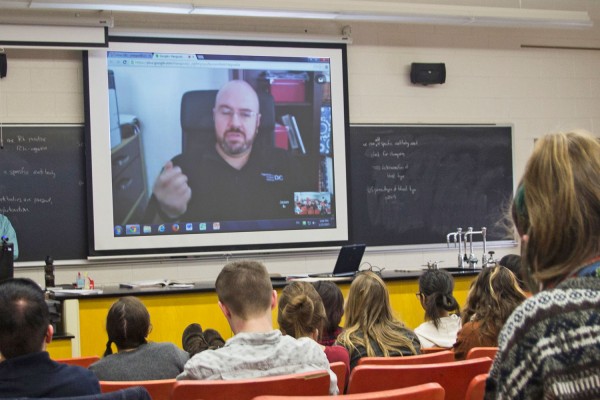Chemistry course explores real-life CSI
By Janet Garcia ’16

Over the last 10-15 years forensic science has made its way into pop culture, from films to television shows such as “CSI: Crime Scene Investigation.” In the chemistry course Real Life CSI, Professor Craig Teague offers students a chance to explore the real-world practice of forensic science and compare it to the Hollywood version.
“Often the portrayals of scientific techniques are depicted reasonably well with the exception of how long it takes to do them,” Teague said. “The scientists are also inaccurately portrayed as doing everything from tests to interviewing suspects; though of course that’s part of the drama aspect.”
Teague utilizes a variety of teaching methods in the course, from analyzing TV episodes, to a field trip to the Iowa state crime lab, to interactions with Cornell graduates pursuing forensic science as a career.
“It was interesting to hear about their jobs and the kind of science they encounter every day, but it was even better to see where some Cornell graduates have ended up and to see what life can be like after college,” said junior Mauricio Huertas.
The alumni guests included Megan Macomber ’09 of the Nebraska State Patrol Crime Laboratory and Jason Kolowski ’98, director of the District of Columbia Forensic Science Laboratory. Kolowski joined the class twice via Google Hangouts. He emphasized the importance of details when it comes to forensic science and gave some case examples from his own career, including catching a serial killer by analyzing a single drop of blood.
Reflecting on her time in the class, junior Katherine Uhlenkamp said, “It’s certainly easier to spot science in everyday situations now. The crime application was obviously a lot of fun, but the more mundane applications catch the eye more easily and are more thought-provoking.”
For their final projects, many students chose to take an interdisciplinary approach by incorporating their own major areas of study into their research. For instance, junior Yehuda Serotta and sophomore Emily Wenzel presented on Sherlock Holmes’ influence on forensics, tracing the fictional and real history of various forensic techniques and discovering that many procedures were done in Sherlock Holmes stories before they were done in real life.



